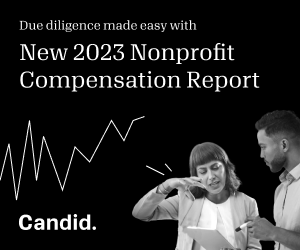How nonprofit leaders can confront declining trust in our sector

Anyone who hopes to realize true multiracial democracy in this country should pay attention to sobering new research released last month showing a steady decline in trust in nonprofits. Only 52 percent of Americans say they trust nonprofits to do what’s right, down a statistically significant 4 percentage points from last year.
Some may see this trend as simply following dwindling public confidence in other institutions; after all, while half of Americans still trust nonprofits, only about a quarter trust the government, corporations, and the media. However, this downward trend in the trust of nonprofits, which accelerated considerably this past year, is especially unnerving because mission-driven organizations play a critical role in our country’s well-being—from supporting civic participation to providing essential services.
How did we get here?
As leaders who have worked to advance racial and economic equity for decades, one thing is clear: Our sector is failing to use its power and resources to create true systemic change because we are not pulling the levers of democracy available to us. The public expects nonprofits to provide aid to those in need; to fill gaps where government and business have failed; and to step up amid the cost-of-living crisis. And the stakes couldn’t be higher: Nearly 100 million people in the United States—a third of our population—live in poverty, squeezed so thin that one medical bill, car accident, or late rent payment can lead to insurmountable crises. This widening inequality, coupled with attacks on the policies that seek to address it, is standing in the way of achieving a multiracial democracy.
Instead of doing the work to structurally change this reality, organizations that seek to transform our society for the better often sit on the sidelines of policy debates. To be clear, nonprofits can, must, and are explicitly allowed to engage in advocacy and lobbying—yet our research from earlier this year finds that only 31 percent of nonprofits reported advocating or lobbying over the last five years. That’s less than half the percentage that reported lobbying in 2000.
We often hear from organizations that they “can’t be political” or “don’t have the resources to do advocacy.” But when we don't advocate for our missions and the communities we serve, we’re leaving our power on the table and missing the opportunity to deliver results commensurate with the moment we’re in.
Nonprofits make up a vital part of our society and our economy. We provide a significant portion of the nation’s health care, higher education, environmental stewardship, human services, religious services, arts and culture, and other vital services essential to flourishing communities. The nonprofit sector also represents more than 5 percent of the Gross Domestic Product (GDP) and, collectively, is the nation’s third largest private employer, employing 12.5 million Americans.
Nonprofit leaders can begin by understanding the tools at their disposal. As we shared in response to the House Ways and Means Committee's recent request for information on nonprofit political activity, the sector needs clearer rules so nonprofit leaders can more easily understand and navigate the lines between what activities are allowed and what activities are prohibited. The sector needs more training, capacity building, and coalitions to carry out meaningful advocacy and civic engagement. And, where many funders have declined to fund advocacy efforts in the past, we need philanthropy to step up to intentionally resource this crucial tool for equity and change. In short, nonprofits need clear rules, adequate tools, and resources from funders to do this work.
Nonprofits are working hard every day to confront pressing challenges and lift up those in need. However, to usher in the transformation we truly want to see, we must also use our power to address the root causes of inequity. Powerful things happen when organizations make a committed effort and have reliable resources to push for legislative, regulatory, and public policy change. Many of the most notable examples of policy progress in recent years resulted from relentless advocacy led by nonprofits, from the expansion of veteran health care to tenant protections to voter rights.
These, and many more, cases of our sector's involvement in policy discourse cannot remain exceptions to the status quo. This work is essential for the missions of nonprofits, and the broader changes we seek for those we serve do not come without it.
Now is not the time for retreat. It’s time for us to lean into our power and deliver results. We urgently need more leaders to commit to doing the work that will transform our social systems. Let’s earn back the trust needed to build a multiracial democracy where all people—particularly those who face the burdens of structural oppression—can prosper.
Dr. Akilah Watkins is president and CEO of Independent Sector, and Dr. Michael McAfee is president and CEO of PolicyLink.







